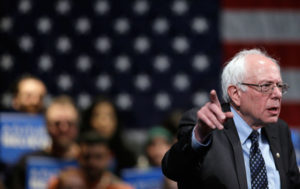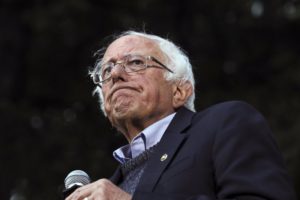The Debate: Independence or Partisanship
Finally, there is a much needed debate about the relationship that people who are working for progressive change should have with the Democratic Party -- one that has existed at the edges, in email discussions and private conversations, but is now moving to center stage. And it includes the issue of a presidential run by Sen. Bernie Sanders.
By Kevin Zeese and Margaret Flowers, TruthoutThis piece first appeared at Truthout.
Finally there is a much needed debate about the relationship that people who are working for progressive change should have with the Democratic Party. This is a debate that has existed at the edges, in email discussions and private conversations, but is now moving to center stage.
The current debate began with an article in Harper’s, “Nothing Left,” by Adolph Reed, criticizing how the Democratic Party has limited the agenda of the left. It was followed by articles by historian Mike Konczal writing in The New Republic and Harold Meyerson writing in the Democratic Party-leaning American Prospect who took the view that the “left” needs to work within the Democratic Party. Richard Eskow of Campaign for America’s Future, also a Democratic Party-leaning group, published two articles. The first said this debate was long overdue and concluded the left must not limit itself to the Democratic Party agenda. The second seemed to put aside differences on partisanship and urged us to get to the work of building a movement. In this article he also provided excellent responses to Konczal and Meyerson.
With Senator Bernie Sanders considering a presidential run and asking people to share their thoughts on whether he should run as an independent or a Democrat, the debate over partisanship is going to grow. We view this as an important opportunity to help many Americans realize that we need to escape from the two-party trap, as we try to do through our daily movement news and resource website, PopularResistance.org.
Movements Broaden the Agenda by Taking an Uncompromising Stand
Popular Resistance sees its job as not adapting to political limitations but building a movement that puts our issues on the political agenda. We must build a mass movement that is independent of the two parties, especially the Democratic Party, because their agenda is too corrupted by the ‘rule of money.’ We recognize that what is considered to be politically acceptable does not challenge the current system and therefore fails to actually solve the problems we face.
We adopt the view of Dr. Martin Luther King, Jr. who did not ally with either party. King said “I feel someone must remain in the position of non-alignment, so that he can look objectively at both parties and be the conscience of both—not the servant or master of either.” Just as King faced two parties dominated by segregationists when he was fighting Jim Crow segregation, we face two parties dominated by mega-corporate power when we are fighting the domination of government by big business interests. Just as King made the immorality of racism unacceptable, we must take a moral stand against putting the interests of money before the necessities of the people.
The obscenity of tax cuts for the wealthy and big corporations — which has occurred at every level of government — while cutting necessary public services is not just misplaced priorities, these are immoral decisions. A child going hungry while the already wealthy hoard more wealth is one of the many immoral outcomes of these decisions. We need to explain these choices and be the conscience of a political system that is off track and of elected officials who put increasing the wealth of their campaign donors ahead of the necessities of their constituents.
The rule of money has become so deep in U.S. government that the menu at the political table is very limited. The real solutions to the multiple economic and environmental crises we face are supported by the majority of the public but are not allowed in the political discussion. It is not our job as activists to limit ourselves to the choices allowed by this corrupt system but to expand the choices. Occupy’s greatest impact was to put issues on the political agenda that were not on it.
Where Is Our Power In The Electoral System?
U.S. democracy has developed into a rigged electoral system – a ‘managed democracy.’ People who want real change will not get it by selecting between two pre-approved candidates who are both supported by the money of transnational corporations, Wall Street banks and other big business interests. The most important aspects of political participation are outside of this managed democracy, but this does not mean we cannot impact the electoral system and use it to build a mass movement.
The mistake made after the 2000 election was the knee jerk reaction of the liberal intelligencia, which is aligned with the Democratic Party, to blame Ralph Nader for Al Gore’s loss to George W. Bush. They did not want to look in the mirror and see the faults of their party under the Clinton-Gore leadership that moved it further into the grasp of Wall Street, the insurance industry and other big business interests. Gore lost primarily because he was a terrible candidate who could not win his home state or Clinton’s and who put forward a corporate agenda rather than a populist, progressive agenda. He was the classic Republican-lite that turned off voters who wanted someone who took their concerns seriously.
If there had been an honest appraisal, more on the left would have realized that we need to embrace an alternative to the Democratic Party and should not fear undermining corporate Democrats. U.S. history has demonstrated that people can influence the direction of the country by standing for what they believe in — whether or not you win the election. Third parties have changed the political direction of the country even without winning elections by putting new issues on the political agenda. This history is missed in the debate on electoral strategy. There is power in putting forward new issues that gain electoral support and thereby force issues onto the agenda.
This history is long. We can go back to the most divisive issue in US history, slavery, to see the impact non-winning candidates played in changing the political discourse. From the nation’s founding the issue of abolition was off the political agenda in Congress and slavery became the most valuable business in the nation. Neither party would discuss abolition until the westward expansion began, and then the debate was about expanding slavery, not ending it.There had been an abolition movement from before the Revolution; indeed Vermont abolished slavery in its Constitution in 1777. Frustrated by abolition being off the agenda, abolitionists began running for office in the Liberty Party in 1840. Former president Martin Van Buren ran against slavery in 1848 under the Free Soil Party, while receiving no Electoral College votes he won enough votes in New York for the election to go to slave-holding Whig, Zachary Taylor. The Fugitive Slave Act of 1850 pushed many Whigs and some Democrats into the Free Soil Party. The abolitionists were called spoilers but they did not back away. They continued to run, show electoral support and grow. By 1854 the Free Soilers, former Whigs and anti-slavery activists formed the Republican Party. Abraham Lincoln was the first Republican presidential candidate winning a four-way race with 39.7% of the vote. It was the refusal to back down on the issue of slavery that led to their ultimate success.
The history of third parties since then has impacted a wide array of issues including the eight hour work day, ending child labor, collective bargaining, women’s voting rights and New Deal policies. All of these were rooted in campaigns that never won the presidency, but third parties put them on the agenda, showed political support and forced one of the two major parties to adopt their views. This has consistently been the way progressives have put issues that were ‘off the political agenda’ onto the agenda through electoral politics.
The lesson for the two parties is that when a movement shows electoral support in third party campaigns, they have two choices. First, they can follow the path of the Whigs and resist the movement and become extinct. Second, they can adopt the issues of the movement by advocating for them and grow. Either path serves the movement’s goal of creating transformative change.
These parties did not act only in the electoral sphere, but were tied to mass movements. Today, we see the development of a mass movement for social, economic and environmental justice that is rooted in the unfair economy created by big finance capitalism and the corrupt government ruled by money and not the people. And, we are beginning to see the signs of electoral efforts coming out of that movement. Some notable examples are the socialist Sawant campaign for the city council in Seattle, labor activists breaking from the Democratic Party in Ohio and, at least rhetorically, the Democratic mayoral campaigns in New York and Boston. These local campaigns show the beginnings of an electoral impact from the movement for economic, social and environmental justice.
The Potential Presidential Campaign of Bernie Sanders
Senator Bernie Sanders is wrestling with whether he should run for president and if so, whether he should do so in the Democratic Party or independently of it. The socialist-turned-independent candidate is facing a challenging decision in our rigged electoral system. In truth, both insurgent Democrats and third party candidates have a very hard electoral path in this managed democracy. On balance, we come out in favor of running independently of the two parties.
Sanders is right to recognize that a major purpose of his campaign is to help build a mass movement. That movement is already growing, so Sanders should realize he is joining an effort at movement building, not starting the effort. And, people in the movement and growing percentages of Americans are turned off by the two major parties with a record 46 percent defining themselves as independents. This number has grown by almost 10 percent in one year.
The strength of any candidate begins with their credibility — are they who they say they are? Sanders’ political career began in 1971 when he ran and lost several campaigns for senate and governor with the Liberty Union Party which opposed the Vietnam War. He won the mayoralty of Burlington, Vermont as a Socialist in 1981. He won the mayor’s race four times, the final time defeating a candidate endorsed by both the Democrats and Republicans. He won a seat in Congress in 1988 as an Independent where, among other things, he co-founded the Congressional Progressive Caucus. Sanders won his current seat in the US Senate in 2005.
For 43 years Sanders has sought electoral office as a non-Democrat. For him to suddenly shift to the Democratic Party would raise questions about his integrity as a candidate. Rather than someone with principles who criticizes the corruption of the Democratic Party, many will see him as a political opportunist who will change his political stripes to run for office. While he can try to explain this away out of political necessity, the question will linger – can he be trusted?
Would this self-sacrifice of his integrity be worth it? The chances of winning a Democratic primary are almost nil. The system is stacked against him as they are for any insurgent who challenges the foundation of the Democrats funding in Wall Street and big business.
How does running as a Democrat play out? First, as we have seen in other primaries, candidates will be asked in debates: will you support whoever is the Democratic nominee? This is a deadly question for a critic of the Democratic Party. If Sanders says ‘yes,’ he will have lost all of his integrity in the eyes of voters. The likely nominee at this stage is Hillary Clinton who since leaving the State Department has made more than a million dollars in speeches to Wall Street and investor interests, at a price of $200,000 minimum per speech. She has tacked to the militarist right of President Obama on Iran, Russia, Syria and Israel. Sanders will be endorsing someone who can fairly be described as a Wall Street militarist. His role in the election will be to run in the primaries, keep progressives, independents and radicals in the party for his campaign, and then endorse a Wall Street Democrat. He will undermine the building of a movement by pulling people into the Democratic Party.
If he answers that he will not necessarily support the Democratic nominee, then he risks being excluded from debates. This has happened before, and with Sanders’ more than 40 year history of not being a Democrat, partisans have more than enough ammunition to keep him out of debates. If this is the path that is taken, Sanders’ voice will be muted.
Finally, running as a Democrat means that his voice will only be heard in the primaries not in the General Election. Most Americans, who are not closely tied to either party, do not pay attention to the primary season but only get involved in elections when the nominations are complete. His message will be heard by partisans, not by the broader public.The two big barriers to third party runs are ballot access and inclusion in the debates. Ballot access takes up most of the time, money and volunteer energy of third party candidates. To be successful at this, Sanders should run as an Independent who seeks to work with multiple existing third parties and create parties or ballot lines in states where there is not an existing third party. He should make this strategy clear at the outset and note the positive value of uniting opposition to the Democrats and Republicans. The Green Party, with an agenda consistent with Sanders, will be on the ballot in half the states by 2016, including some big challenges like California, Texas, New York and Florida. There are also state-level progressive parties whose nomination Sanders should also seek as well as smaller national parties such as the Justice Party or the various Socialist Parties. If he is nominated by a coalition of parties, Sanders would only have to get on the ballot in 20 or so more states. Sanders could make a show of unity against the two parties by holding a Unity Convention perhaps on Labor Day to show his support for working people.
The presidential debates are another challenge. Sanders has an advantage in that he is starting as a US Senator with some national name recognition. Since polls are in large part about name recognition, he should immediately do better in polls than most third party candidates. If he can unite multiple parties, that will add to his support, media attention and name recognition. With all of this he will have the credibility to raise tens of millions of dollars which will ensure he is taken seriously. In recent elections, there has been a growing awareness of the unfairness of the private corporation that sponsors presidential debates. This corporation, co-chaired by former leaders of the Republican and Democratic Parties and funded by big business interests, has worked hard to keep third party candidates out. The combination of Sanders’ credibility and the movement challenging the Commission on Presidential Debates makes it possible to overcome this challenge as well.
If Sanders can overcome these two obstacles he will have an opportunity to put forward an independent progressive agenda that challenges the ‘rule of money’ and foreign policy based on militarism in ways that are essential to building a mass movement. And, if he is successful in raising these issues and garnering a significant percentage of the vote, it will be possible to build on this and create an ongoing third party, perhaps uniting the various parties that supported him, in a longer-term, more formal way.
The Unique Opportunity of the Moment
There is a unique opportunity to build an independent mass movement. Many progressive Democrats have learned that the best their party can produce, Barack Obama, is unsatisfactory. Whether on militarism, Wall Street, the environment or other issues that are being faced, Obama has sided with big business interests rather than the people. Americans have seen the bi-partisans in Congress ally against their interests and in support of big business or the security state repeatedly in recent years.
In addition to record numbers of Americans defining themselves as independents, a record number of Americans want a third party according to a 2013 poll. Sixty percent say the Democratic and Republicans parties do such a poor job of representing the American people that a third major party is needed. Indeed, a new low of 26 percent believe the two major parties adequately represent Americans. And, a 2012 poll found that 68 percent of voters said they would “definitely vote for” or “consider voting for” a third-party candidate. These are polls unlike any we have seen before.
At the same time, people’s movements are growing, creating a new national consensus. The Occupy encampments were a popular revolt against the system, challenging Wall Street domination of the economy and political system and calling for systemic change. Since the encampment phase has ended the movement has actually grown with mass protests against poverty wages, extreme energy extraction, tuition and debt of college students and the wealth divide among other issues. This is a moment to put these issues on the agenda and the electoral process should be used as part of that effort.
Kevin Zeese, JD and Margaret Flowers, MD are participants in PopularResistance.org; they co-direct It’s Our Economy and co-host Clearing the FOG radio. Their twitters are @KBZeese and MFlowers8.
Your support matters…Independent journalism is under threat and overshadowed by heavily funded mainstream media.
You can help level the playing field. Become a member.
Your tax-deductible contribution keeps us digging beneath the headlines to give you thought-provoking, investigative reporting and analysis that unearths what's really happening- without compromise.
Give today to support our courageous, independent journalists.






You need to be a supporter to comment.
There are currently no responses to this article.
Be the first to respond.